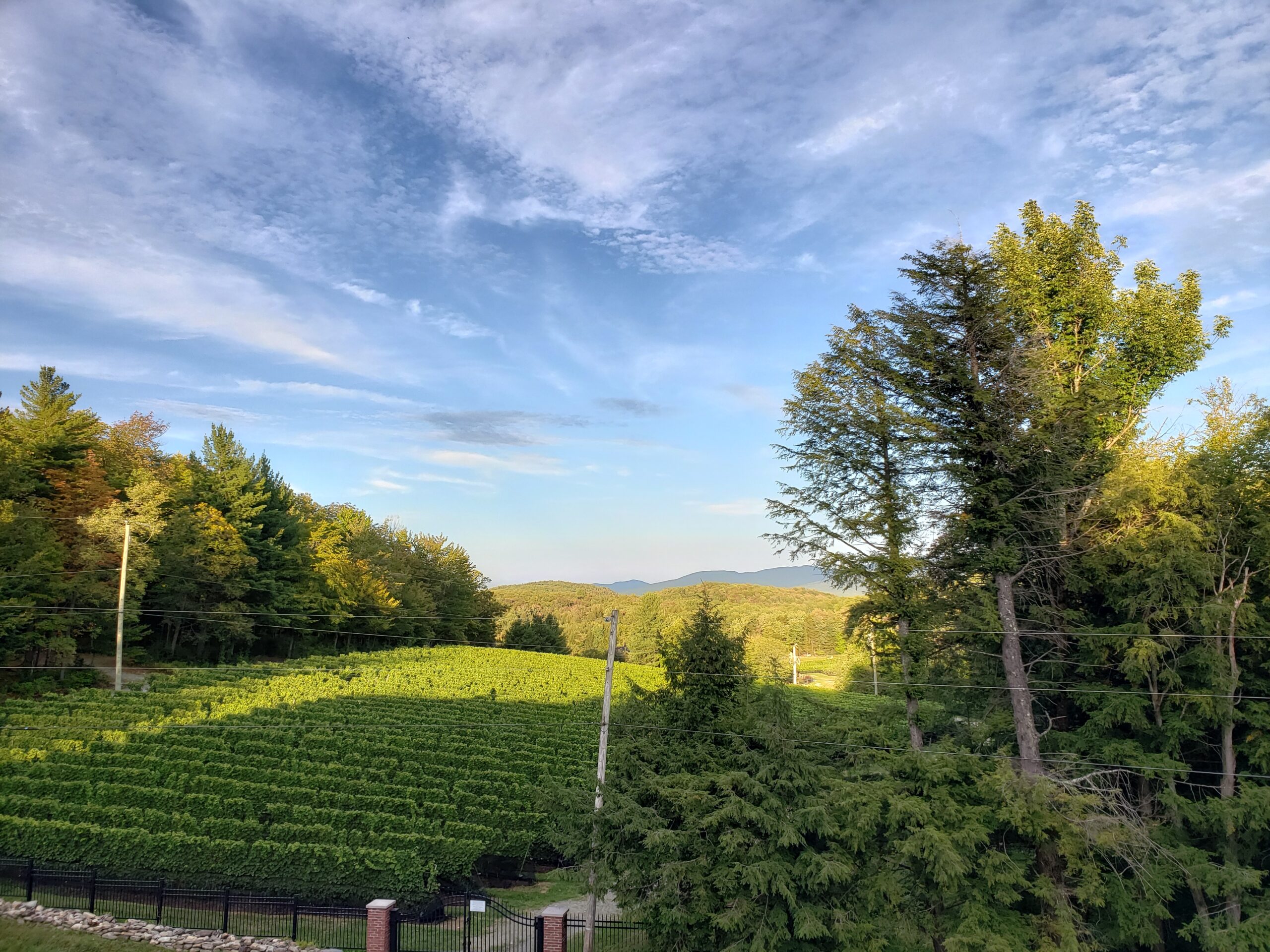
Pastoral countryside picnics, concerts under the stars, sculpture-lined trails, and wood-fired pizza to pair with your glass of vin rouge. These are just some of the hidden gems you’ll discover along La Route des Vins Brome-Missisquoi, a 140-kilometre stretch of wineries that winds through the bucolic Appalachian foothills of the Eastern Townships.
This year, La Route des Vins (“The Wine Route”) is celebrating its 20th anniversary. In honour of the milestone, La Route des Vins will host a multitude of wine tastings, concerts and gastronomic experiences across its network of 22 wineries, which produce 60% of the wines made in Quebec. Depending on which vineyard you head to first, each winery is located just a 45-minute to 1-hour drive from Montreal. For cyclists, four different bike circuits are yours to explore.
Sip your way through La Route des Vins
Known as the cradle of Quebec viticulture, the regional county municipality of Brome-Missisquoi provides the picturesque backdrop to La Route des Vins. Set against rolling valleys, mountains, lakes and quaint Loyalist villages, Brome-Missisquoi houses a rich heritage and a spellbinding natural beauty that stays with you long after you visit.

Along the wine route, you’ll have the chance to explore Amis de la Route des Vins (“Friends of the Wine Route”), a network of over 100 restaurants, farms, shops, spas, microbreweries and bed-and-breakfasts. It’s well worth checking out: On the roads of the wine route, you’ll spy the burgundy-coloured signs guiding you to Amis de la Route des Vins.
Whether you visit Balnea Spa for a relaxing thermal experience or you stop by an alpaca farm for a whimsical wooded walk, there’s no shortage of memorable experiences when you’re among friends of the wine route.
History of La Route des Vins
In 2003, La Route des Vins was founded to promote the region’s growing network of vineyards and winemakers. The first and oldest vineyard on the wine route, Dunham’s Le Domaine des Côtes d’Ardoise, opened in 1980, growing Gamay, Riesling, Maréchal Foch and Seyval Blanc. Since then, over 20 new vineyards have been established across the region. While the heart of the wine route is in Dunham, you’ll also find wineries in Saint-Armand, Bromont, Brome Lake, Cowansville, Sutton and beyond.

Grape varieties of La Route des Vins

Brome-Missisquoi’s natural terroir is favourable to many types of grapes that are suitable for wine-making. According to Vins du Quebec, some of the most-cultivated grapes for white wines in Quebec include Frontenac Blanc, Vidal and Seyval Blanc. Quebec red wines are frequently made from Frontenac Noir, Marquette, Petite Pearl and Maréchal Foch, while Frontenac Gris is a versatile grape that’s popular for light white wines, ice wine or rosé.
The rolling hills of the Eastern Townships ensure a quality terroir, bringing the necessary altitude for proper vine irrigation and optimal exposure to sunlight. Despite Quebec’s cold winters, the climate is well-suited to wine thanks to the right amount of heat needed for growing-degree days (GDD). (GDDs provide an index of the amount of the heat that’s necessary for the growth and maturation of the plants needed to produce quality wine per year.)
The region is also home to glacier deposits and soil materials such as clay, slate and silty sands, all beneficial elements that contribute to a good glass of wine.
Red or white?

The question remains, which type of Quebec grapes yield the best taste? In our opinion, you can’t go wrong with a Quebec white wine or rosé. Ice wines are also spectacular in the region.
While we’re big fans of BC, Ontario and international red wines, we’re still searching for a Quebec red we can whole-heartedly recommend. Don’t get us wrong – Quebec red wines appeal to different tastes, and there are certainly some that come close to hitting the mark. However, we’ve found that some of the local reds we’ve tried could benefit from a longer period of aging.
Wine connoisseurs, take note: The “Vin du Quebec” IGP certification was established in 2018. The IGP is a protected geographical certification that sets quality and traceability standards for every aspect of wine production, from planting grapes to bottling the final product.
IGP-certified wines must pass a blind taste test and come from grapes grown exclusively in Quebec. If you’re serious about your wines, try a product that’s IGP-certified and judge for yourself!
Many local winemakers continue to innovate and adapt their wine-making processes from season to season. We’ll be keeping an eye out this summer as we taste the new harvests, from white to red!

La Route des Vins’ 20th Anniversary Events

Pop-up concerts and wine tastings
La Tournée Escale, which hosts outdoor concerts in various agritourism locations across Quebec, will host a four-day pop-up festival at four vineyards in July. The festival will feature musical performances by 16 emerging artists. Tickets are $37 and include tastings of three different wines.
Concerts and tastings will take place at the following vineyards:
Vignoble Bromont – July 15
Buy tickets here.
Domaine Du P’tit Bonheur – July 16
Buy tickets here.
Vignoble Domaine Bresee – July 22
Buy tickets here.
Vignoble Val Caudalies – July 23
Buy tickets here.

La Grande Tablée
The much-anticipated culinary event returns for its second year. To help commemorate the 20th anniversary of the wine route, La Grande Tablée will host open-air dinners at three farms across Brome Lake. Each will spotlight a different five-course menu by a local chef, who will be on-site to execute the menu with local food, wine and cocktail pairings.
Vitalité Sureau – July 7 and 8 – Guest chef: Patrick Morrissette
Léon Courville Vigneron – July 21 – Guest chef: Lysanne O’Bomsawin, a caterer and chef who specializes in Indigenous and Quebec cuisines
Les Fermes Cheeky Creek – August 5 – Guest chef: Chloé Ostiguy, chef and owner of L’Archipel catering








